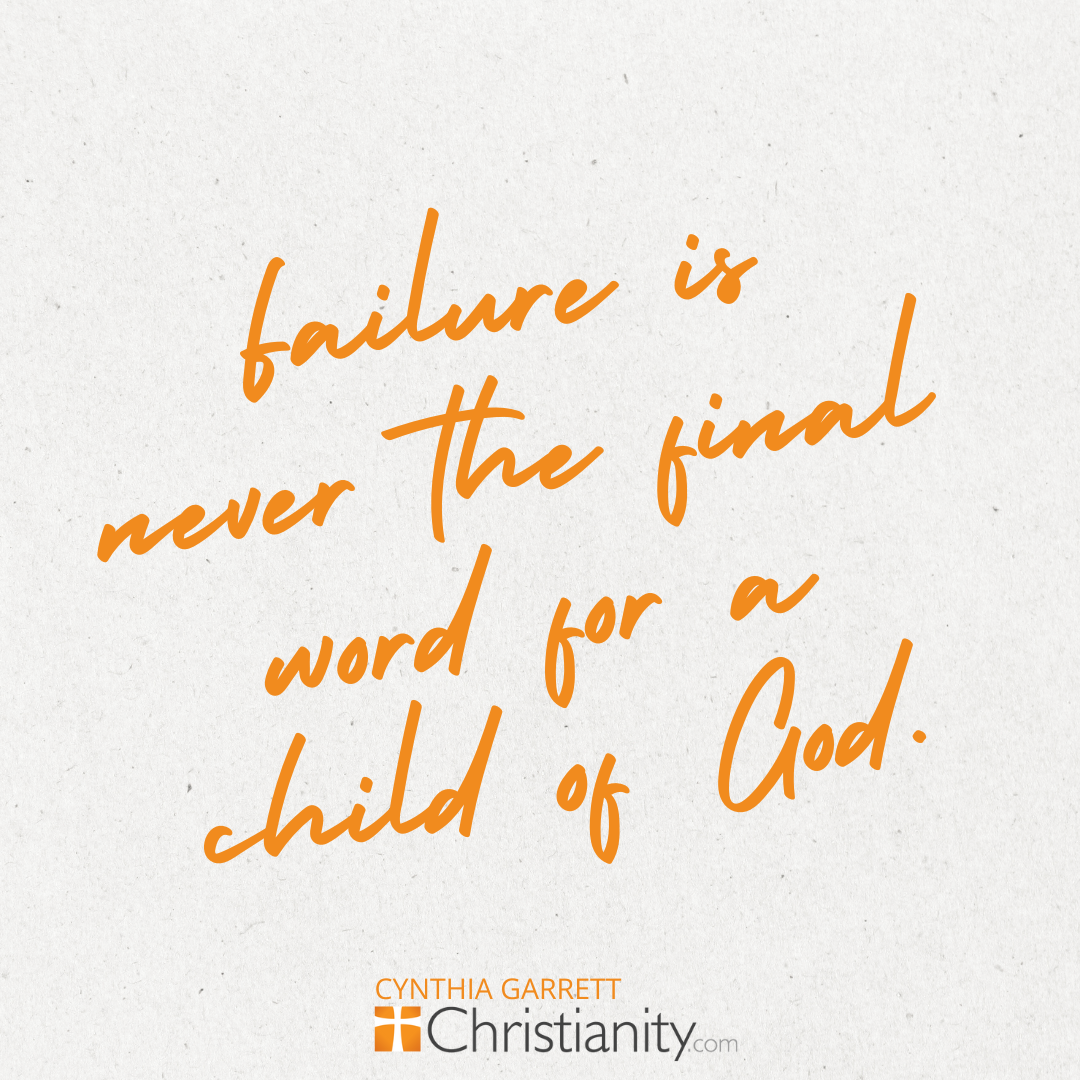Failure. It’s a word that stings.
Maybe you’ve felt it recently. You’ve looked at your life, choices, relationships, finances, or faith and thought, “I blew it. I’m not enough. I failed. I’m too old. I missed it.”
It’s a common human experience. We’ve all tasted disappointment, whether in our own decisions or circumstances that didn’t turn out how we hoped. But what do we do with those moments? Where does God meet us when we feel like failures? Let me tell you something upfront: failure is never the final word for a child of God.
The World’s Verdict vs. God’s Verdict
The world has a system for grading success. If your bank account is full, your career is climbing, your marriage looks perfect, your kids are thriving, your body is toned, and your reputation is spotless, congratulations—you’re “successful.” But fall short in any area, and the world quickly stamps failure across your forehead. But God doesn’t grade the way the world grades. 1 Samuel 16:7 reminds us,
“The Lord does not look at the things people look at. People look at the outward appearance, but the Lord looks at the heart.”
That means God isn’t judging you by worldly scoreboards. He looks at the posture of your heart. He looks at your willingness to repent, trust Him, and get back up and walk again. So while the world may define you by your lowest moment, God defines you by His love.
Failure Is a Teacher
It’s important to realize failure can actually be a teacher. Think about Peter. He loved Jesus passionately, but on the night Jesus was arrested, Peter denied Him three times. If anyone could wear the label of failure, it was Peter. And yet, in John 21, we see the risen Jesus restoring Peter by the Sea of Galilee. Three times, Jesus asked him,
“Do you love me?”—one question for each denial. Then Jesus recommissioned Peter: “Feed my sheep.”
Peter’s failure became the soil where God grew humility, dependence, and boldness. Later, Peter preached at Pentecost, and 3,000 people came to faith. Imagine if Peter had given up because of shame! His failure was real, but it wasn’t final. That’s the lesson: failure doesn’t disqualify you—it prepares you. If you let it, failure can become the greatest classroom of your life.

God’s Grace Is Bigger Than Your Mistakes
We need to anchor in this truth: God’s grace is always bigger than our failures. Romans 8:1 declares, “
There is now no condemnation for those who are in Christ Jesus.”
Notice what it doesn’t say. It doesn’t say there are some mistakes God won’t forgive. It doesn’t say there are certain failures too big to come back from. No—it says there is no condemnation. None. That means if you’re in Christ, you’re not defined by your worst day. You’re defined by His best day—when He died and rose again for you.
This doesn’t minimize the pain of failure, but it does reframe it. You may have messed up, but you are not a mess-up. You may have failed, but you are not a failure. God’s grace covers you, restores you, and rewrites your story.
4 Biblical Voices Who “Failed”
Let’s not forget that Scripture is full of people who looked like failures:
1. Moses killed a man and fled into the desert. Yet God called him to lead Israel out of slavery.
2. David committed adultery and orchestrated a murder. Yet God called him a man after His own heart.
3. Elijah ran from Jezebel, sat under a broom tree, and begged God to take his life. Yet God restored him and used him powerfully again.
4. Paul persecuted Christians. Yet God made him the apostle to the Gentiles.
Do you see the pattern? Our failures don’t cancel God’s plans. If anything, they highlight His mercy. He delights in taking broken people and using them for His glory. So if you feel like a failure today, you’re in good company. You’re in the same category as Moses, David, Elijah, Paul, and Peter—men whose lowest moments became turning points in God’s hands.
The Difference between Failing and Quitting
Now let’s be clear: failure is not the same as quitting. Proverbs 24:16 says,
“Though the righteous fall seven times, they rise again, but the wicked stumble when calamity strikes.”
The difference between the righteous and the wicked isn’t that the righteous never fall. They fall plenty. The difference is—they get back up. Failure becomes final only when we refuse to rise. But when we get back up, trusting God, failure fuels growth. I love how Micah 7:8 puts it: “Though I have fallen, I will rise. Though I sit in darkness, the Lord will be my light.” That’s the anthem of a believer who refuses to let failure have the last word.
4 Practical Steps to Turn Failure into Fuel
So how do we practically respond when we feel like failures? Let me give you four steps:
1. Bring it into the light.
Shame grows in darkness. Confess your failure to God. If needed, confess it to a trusted friend or pastor. James 5:16 tells us, “Confess your sins to each other and pray for each other so that you may be healed.” Healing begins with honesty.
2. Receive God’s forgiveness.
Don’t just know intellectually that God forgives—actually receive it. Say, “Lord, I accept Your mercy. I accept Your grace. I leave this failure at the cross.”
3. Learn from it.
Ask God, “What are You teaching me through this?” Maybe it’s humility. Perhaps it’s patience. Maybe it’s dependence on Him. Failure wastes nothing if surrendered to God.
4. Move forward.
Don’t camp at your failure site. Philippians 3:13-14 says, “Forgetting what is behind and straining toward what is ahead, I press on toward the goal…” Leave the past in the past. Press forward into God’s future for you.
The Cross Is the Ultimate Reversal
At the heart of the gospel is the greatest failure in history. Jesus hanging on a cross looked like defeat. His followers scattered. His enemies gloated. Hope seemed crushed. And yet, what looked like failure was actually victory. The cross was not the end; it was the doorway to resurrection. That means when you feel like a failure, you’re actually standing on the very ground where God loves to work. He specializes in resurrection stories. He always takes what looks like a loss and turns it into life.
An Encouraging Word for What Feels Like Failure
If you’re reading this and feel like a failure, let me speak directly: You are not disqualified. Your mistakes do not define you. You are not too far gone. The God who restored Peter, Moses, David, Elijah, and Paul is the same God who will restore you. His mercy is new this morning. His grace is sufficient for you. His love has not wavered.
Failure may be part of your story, but it is not the headline. The headline is grace. The headline is redemption. The headline is Jesus. So, here’s my challenge: Stop rehearsing your failures and start rehearsing God’s promises. Instead of repeating, “I failed,” start declaring, “Though I fall, I will rise. The Lord is my light. His grace is sufficient. His power is made perfect in my weakness.”
This week, take one step forward: Make the call, apologize, restart the project, get back into prayer, go back to church, and begin again. Because with God, you can always begin again.
A Prayer to Begin Again
Father,
Thank You that failure is never the end with You. Thank You for grace that lifts us when we fall, mercy that rewrites our story, and love that never lets go. Lord, for every heart weighed down by shame or regret, breathe hope again. Remind us that in Christ we are not condemned—we are redeemed. Give us courage to rise, strength to move forward, and faith to trust that You are making all things new.
In Jesus’ name,
Amen.
Photo Credit: ©GettyImages/AntonioGuillem
Cynthia Garrett broke barriers when she became the first African American woman in the U.S. to host a network late-night show, NBC’s Later with Cynthia Garrett. She is currently seen on TBN and Salem Media networks, as well as on Fox News and other news outlets, addressing cultural issues and today’s news. The Cynthia Garrett Podcasts premiere weekly on all major podcast platforms.
A highly sought-after speaker, author, TV host, and ordained minister, Garrett is the author of The Naked Truth: Reclaiming Sexual Freedom in a Culture of Lies (2024), I Choose Victory: Moving from Victim to Victor (2020), and Prodigal Daughter: A Journey Home to Identity (2016). For more information, visit www.cynthiagarrett.org





